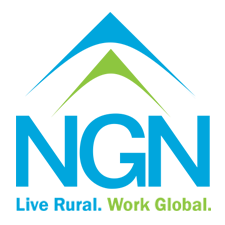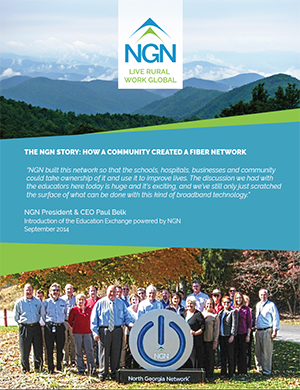New one gigabyte connections offer 20 times more capacity for students, teachers
DAHLONEGA, Ga. (Aug. 7, 2012) – Several northeast Georgia schools will be enjoying Internet connection speeds as fast as anywhere else in the world when classes begin this month.
Schools in Union, White, Habersham, Lumpkin and Dawson counties are now connected to the North Georgia Network’s high-speed fiber optic network. The 260-mile core ring of the federally funded broadband project is complete, while middle and last mile fiber is still being installed.
“This changes education dramatically as far as how we deliver teaching to students,” White County Principal John Osborne said. “Technology does not supplant teachers, but it aids greatly in how we teach. This is an additional tool for our teachers. We have 100 iPads in our school that we have not been able to utilize completely, but now we have the capability.”
The White County school system has applied for a Race to the Top grant with 26 other school systems statewide. That would not have been possible without the North Georgia Network. Osborne also noted that school systems on the network would look at new career pathways for their students.
In addition, the high speed fiber optic connection will also make it possible for Internet-based companies to locate in the north Georgia area.
“We will need to, and we will be able to, prepare our students for the types of job that come with those companies,” Osborne said.
Each of the 40-plus schools in the five school systems has one gigabyte of speed and capacity. That is 20 times faster than what most of the schools had in previous years.
“This will connect the schools in our region directly to the world,” said Billy Wise, architect of the North Georgia Network. “Education is a key part of a growing a successful community and an educated workforce. The school systems in our area have an Internet connection that rivals any school district in the country, and this will create lots of new opportunities.”
Each school has a dedicated gigabyte as their direct connection to the Internet. The bandwidth is not shared, so upload and download speeds will remain more stable for students and teachers throughout the day. The connection comes directly to the schools from the Internet hub in Atlanta, guaranteeing a fast connection, and the redundant ring design provides a level of service reliability that is unprecedented in this part of Georgia
The high-speed connection will give the schools the potential to videoconference classes and participate in special events online in real time. Rural communities can use online distance learning to connect them to classes and resources not available locally.
Web 2.0 applications such as including blogs, wikis, instant messaging, social networking and other tools for collaboration and learning will be readily available. The easier access to data driven instruction allows access to information systems which can play a crucial role in improving teaching practices and instruction. The use of multimedia applications also will make learning engaging and relevant.
Uploading materials is faster through the fiber optic network, which will make it easier for administrators and teachers to file reports and secure data from local, state and federal agencies when needed. Communities of practice and online classes to support professional development will be accessible for teachers as well.
The North Georgia Network began as a joint effort of economic development professionals in Dawson, Forsyth, Lumpkin, Union and White counties, North Georgia College & State University, Blue Ridge Mountain EMC and Habersham EMC. The goal was to lay a foundation for a new technology-based economy in the region.
The $42 million North Georgia Network broadband infrastructure project is made possible in large part by the American Recovery and Reinvestment Act (ARRA). ARRA provided grant funds to the National Telecommunications and Information Administration (NTIA) to support major improvements in broadband infrastructure for the nation’s digitally unserved and underserved. In December 2009, NGN became the first organization to be awarded a grant through the program, receiving $33 million under the NTIA’s Broadband Technology Opportunities Program (BTOP). Additional $ 9 million funding came from the State of Georgia, electric utilities and participating local communities.
For more information, contact:
Tiffany Fessler
Morton Vardeman & Carlson
770-536-8921
tiffany@vardeman.com
Jeff Butler
Morton Vardeman & Carlson
770-536-8921
jeff@vardeman.com


